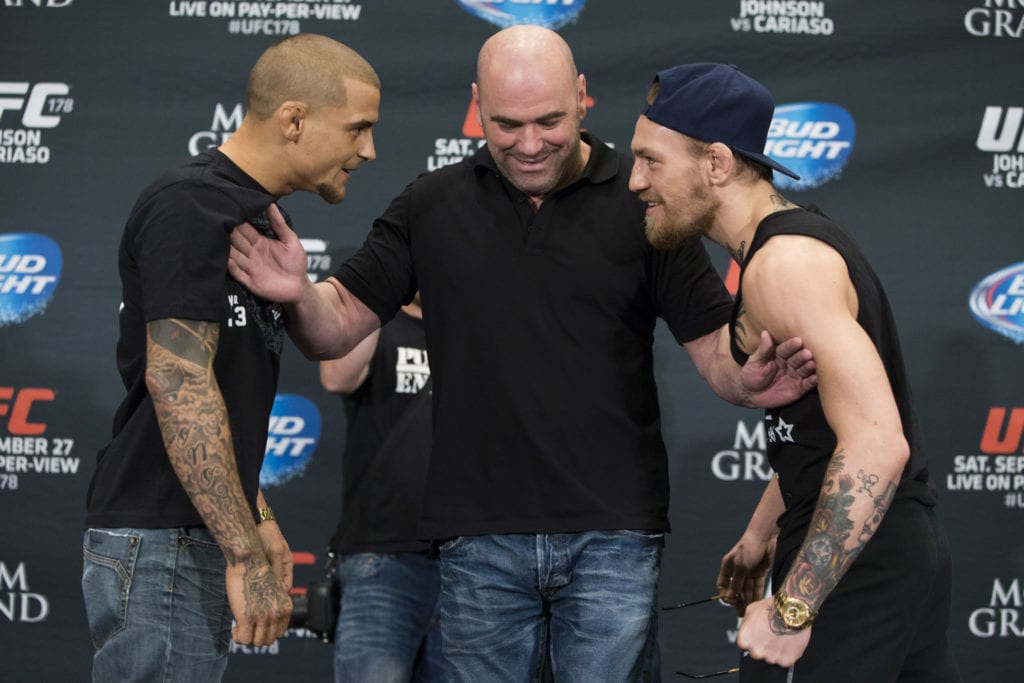
There’s likely nothing in the contract for Dustin Poirier’s UFC 302 fight that explicitly states it will be his last-ever chance at a world championship. However, the fact that Saturday will be his final chance to become the division’s top name when he faces Islam Makhachev has felt like an unwritten rule ever since their matchup was revealed.
In what will be his 31st UFC appearance, 35-year-old Dustin Poirier will be trying to become undisputed champ for a third time. When given those numbers, it’s hard to wonder how much is left in his career.
At least, Poirier is having those thoughts. In the lead-up to his fight this weekend, he told CBS Sports that he’s seriously considering calling it quits soon: “I’ve been doing this a long time. It’s a very selfish sport. I’m ready to be a father and be a husband and be home and be into a routine. I wouldn’t say I can’t do it again. I can do it again. It’s just … this is it for me.”
His recent comments made it clearer than ever that this weekend is Dustin Poirier’s final chance at the lightweight title. Even if there was a world where he could find a fourth pathway to a title, he doesn’t want to walk that route.
Now knowing what Poirier feels on the inside, we’re set up for a dramatic storyline this weekend. It’s no longer an open secret that it’s his last chance, we know it is. Saturday is truly a do or die situation for Poirier to prove that he’s one of the best. But amid all of the hype and drama that will emerge this weekend, it’s important to remember that win or lose, Poirier has already proven enough to be considered a legendary fighter.
Dustin poirier’s Longevity At The Top

When looking at Poirier’s career, it feels like an undisputed championship run is the one thing he hasn’t truly tackled. Other than the elusive undisputed champ status, Poirier has stacked his career full of big moments.
While there isn’t any gold to put to his name (unless you count a brief interim title run), Dustin Poirier has easily been one of the most dominant forces in the lightweight division for a decade. While many top names have come and gone, Poirier has not only stayed active but remained among the best.
Dustin Poirier was just 21 years old when he joined the UFC roster. The Louisiana-born and raised fighter very much grew up in the cage, with his amateur days dating back to when he had just turned 18. Before even hitting what you could consider the prime of his career, Poirier had made a living fighting at featherweight, a division rarely associated with him nowadays. Those who only started following the sport in the mid-2010s amid the popularity of Conor McGregor and Ronda Rousey—myself included—likely wouldn’t have any recollection of this time in his career.
While he had high-profile fights, like a 2012 main event loss to The Korean Zombie, a main event fight the next year against Cub Swanson and a meeting across McGregor in 2014, Dustin Poirier didn’t ever fight for a title in the division and wasn’t making headlines in the ways that more stand-out talents were at that time.
Following his loss to McGregor in 2014, a finish loss that lasted just under two minutes, he made the move up to lightweight. He had already fought 11 times in the promotion by this point, or four years in total. According to internal calculations made by the UFC around this time, this would have made him surpass and nearly double the average length of a career in the promotion, which they had pinned at 2.46 years overall from 1993 to 2014.
Chasing Greatness At Lightweight

After his UFC run had already out-lived many of his peers, Poirier was actually just getting started. Lightweight ended up being the division where he put together his best performances and most high-profile wins, getting him near the title picture on numerous instances.
Things got off to a strong start when he took just one loss through 11 appearances in the division. After main event finish wins over Eddie Alvarez and Justin Gaethje (a past undisputed and interim champ respectively), he was given a shot to face featherweight champ Max Holloway for an interim lightweight title.
Poirier went five rounds against the striking aficionado to capture the belt and win via unanimous decision. Poirier beat Holloway where he is at his best, getting a jump on the talented knockdown artist in the early rounds with clean combinations. Holloway unsurprisingly made the fight close, but not narrow enough for many to consider him victorious.
Holloway had built up an untouchable image heading into that fight, putting together 14 consecutive wins that grew in importance. After stopping legend Jose Aldo twice, he out-gutted Brian Ortega in a stand-up war to defend his belt once again.
While there will always be ways that people take things away from that fight, notably that Holloway had moved up a weight class and that the bout was actually for an interim title instead of the real deal, it’s still certainly a huge victory arguably the biggest of Dustin Poirier’s career. He took out one of the best while they were at their peak, and did so elegantly.
Over the next few years, Poirier would struggle against the absolute best and style on anyone below that level. He lost fights to Khabib Nurmagomedov, Charles Oliveira, and Justin Gaethje, three names you could basically define a division’s entire era with. But against a past-prime Conor McGregor or a rising contender like Benoit Saint-Denis, he would put on a show. Dustin Poirier was a main event draw during this time, with his duo of non-title fight appearances against McGregor both headlining pay-per-view cards.
A Perfect Ending Isn’t Necessary



Just to list the absolute cliff notes of Poirier’s career, you need about 500 words. Poirier has accomplished a lot and left a print on the UFC’s history that even some champs likely won’t leave. Knowing the ins and outs of his career begs the question: How much does he even really need that belt?
It’s obvious that Poirier earning the title would be the best ending possible for his career. Dustin Poirier clearly sees earning the title as a way to complete his run as a fighter and show how great he truly is. He has used the phrase “finish the story” recently, a line that WWE’s Cody Rhodes used to illustrate a lengthy career arc that culminated with him sitting atop the world of professional wrestling.
But wrestling has the privilege to actually choose how stories end. WWE decided that Rhodes would get to reach the top of the mountain, but Poirier isn’t afforded the same luxury. Anything could happen at UFC 302, and oddsmakers seem inclined to think that the night will end with Makhachev still possessing the 155-pound division’s gold.
A championship belt is what everyone is after in MMA, but it’s not the singular litmus test for greatness. Many top names, including champs, can’t say that they have had the career longevity of Dustin Poirier. Few can get one title shot, come back from a loss to earn another, and then do it yet again. Dustin Poirier has just one thing left to prove in the sport, which means he’s proven way more than almost all of his colleagues.
Dustin Poirier’s story could have the perfect ending. But even if it doesn’t, he’s told a hell of a story.